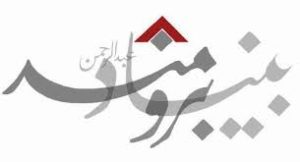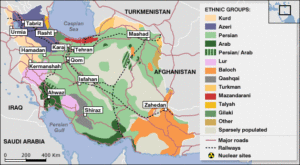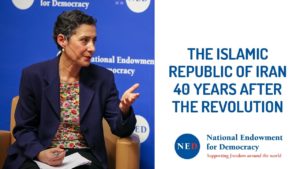Iranians voted for a new parliament Friday, with turnout seen as a key measure of support for Iran’s leadership as sanctions weigh on the economy and U.S. pressure isolates the country diplomatically, The Associated Press reports.
State television aired images Friday of voters lined up at polling stations, and Supreme Leader Ali Khamenei, casting his ballot in Tehran, urged Iranians to participate in the election, The Washington Post adds :Hard-line factions allied with Khamenei are expected to win a majority in parliament, a victory that could politically cripple the more moderate president, Hassan Rouhani.
Voters were choosing almost exclusively from conservative candidates because more than 7,000 reformist candidates have been disqualified by the powerful Guardians Council, note RFE/RL’s Golnaz Esfandiari and Carlos Coelho (above).

Abdorrahman Boroumand Center
Low voter turnout would undermine the government’s legitimacy and suggest widespread disillusionment with the Islamic Republic, observers suggest.
“Many Iranians, disillusioned with political repression and economic recession, will stay home on election day,” said Henry Rome, an Iran analyst at the political risk firm, Eurasia Group. “Low turnout is a strong indicator of a conservative victory, as middle-class moderate voters are the ones who tend to stay home.”
If, as expected, the turnout on Friday is lower than previous years, it will damage the legitimacy that Iran’s theocratic regime traditionally seeks to claim from elections. It would also reflect the deep sense of disillusionment and mistrust many Iranians feel towards their leaders across the political spectrum, the FT adds.
Voters are likely to punish Iran’s ‘powerless’ reformists, Deutsche-Welle reports.
“The Iranian people feel that the elected institutions have no power,” Tehran-based political scientist Sadegh Zibakalam told DW. “All important decisions are made somewhere else.”

Brussels International Center
“Reformists have not been agile enough to address public demands for more reforms [which] means the gap between the nation and the state has further widened,” said Mohammad-Ali Abtahi, a former reformist vice-president. “Reformists who long stood between the state and the nation now feel being pulled apart from both sides. Our biggest mistake [was] to support Rouhani who was not a reformist,” he told The FT.
Two particular events in recent months have undermined the legitimacy of and people’s confidence in the regime, says Ali Fathollah-Nejad, a Visiting Fellow at Brookings Doha Center:
- First, this week’s parliamentary elections come just three months after the momentous November protests — the most widespread anti-regime demonstrations in the history of the Islamic Republic, which reportedly led to the killing of about 1,500 protesters (though Iran’s authorities have refused to name a number). The demonstrations sent shock waves throughout society, the economy, and Iran’s political sphere. …
- Second, they come a month and a half after the Islamic Revolutionary Guard Corps admitted — belatedly — that it accidentally shot down a civilian airliner, killing all 176 mostly Iranian passengers. The tragic mistake undermined the regime’s efforts to use the funerals of commander Qassem Soleimani to create nationalistic momentum toward regime stabilization — instead, the plane crash kicked off anti-regime protests by thousands….Thus, the current social mood in Iran can be described as a mixture of sustained anger toward the regime and a feeling of help- and hopelessness.
 Ladan Boroumand, an historian by training, has spent the better part of her career in exile, promoting the cause of human rights in her native Iran, The American Interest adds:
Ladan Boroumand, an historian by training, has spent the better part of her career in exile, promoting the cause of human rights in her native Iran, The American Interest adds:
Inspired by the legacy of her father, a lawyer and democratic activist killed by agents of the regime, Ladan and her sister Roya launched the Abdorrahman Boroumand Center to catalog the many crimes and repressions of the Islamic Republic. TAI editor-in-chief Jeffrey Gedmin and associate editor Sean Keeley recently sat down with Ladan to discuss her views on changing social trends within Iran, and why she believes the regime is facing a fundamental test of legitimacy.
“The Supreme Leader is starting to look like the Shah through loss of legitimacy—that much is true, although I would say the Shah was never as hated as the Supreme Leader is,” Boroumand contends, drawing on her recent article in the National Endowment for Democracy‘s Journal of Democracy, “Iranians Turn Away from the Islamic Republic.”
“Most grand Ayatollahs have never accepted Khomeini’s absolutization of guardianship and still refuse to this day to accede to his claim that clerical authority extends to matters of political rule,” she adds.
 But Iran still has an organized, vibrant, and innovative civil society, Boroumand (left) suggests:
But Iran still has an organized, vibrant, and innovative civil society, Boroumand (left) suggests:
But the regime is trying to keep these people apart from each other, in prison, and under tremendous pressure. The diaspora has a role to play here. The worse it gets, the more opportunities we will have to appeal for people to quit the regime. But for that we need to offer them a viable alternative and a strong leadership of the opposition. We haven’t seen that yet.
To consolidate support for conservative candidates, more than half of the roughly 16,000 registered candidates were disqualified before election day, The Wall Street Journal reports. Most were reformists and moderates, and their disqualifications sapped population interest vote and fueled the calls for a boycott.
There is no indication yet that a parliament dominated by hardliners—the likely outcome of these elections—will have a strong platform that can introduce the needed changes in Iranian society, notes Banafsheh Keynoush, a Visiting Scholar at Princeton University. Hardliners may achieve a hollow victory unless they are both united and able to offer real, workable policies that quickly alleviate Iranians’ social and economic hardships, she writes for The Washington Institute’s Fikra Forum.
The sad reality is that Iranian voters’ public display of apathy probably won’t change anything for the better, The Post’s Jason Rezaian writes. But one thing is for sure: This election won’t address the fundamental issue — the deep gulf between the Iranian people and their government.
 Ladan Boroumand, an historian by training, has spent the better part of her career in exile, promoting the cause of human rights in her native Iran, The American Interest adds:
Ladan Boroumand, an historian by training, has spent the better part of her career in exile, promoting the cause of human rights in her native Iran, The American Interest adds: But Iran still has an organized, vibrant, and innovative civil society, Boroumand (left) suggests:
But Iran still has an organized, vibrant, and innovative civil society, Boroumand (left) suggests:








